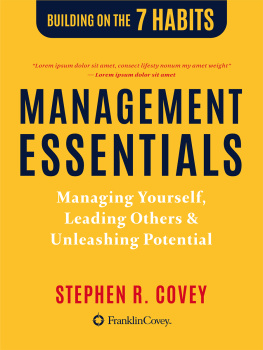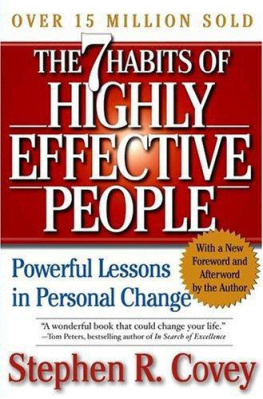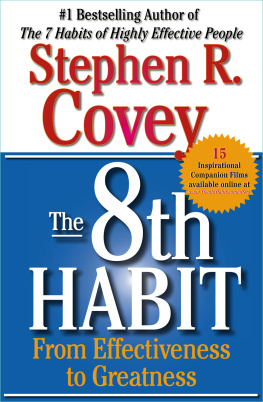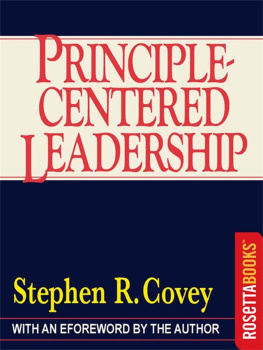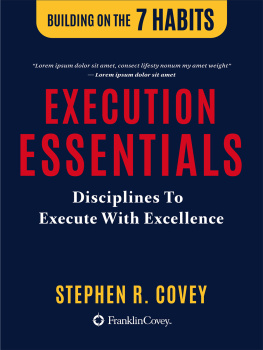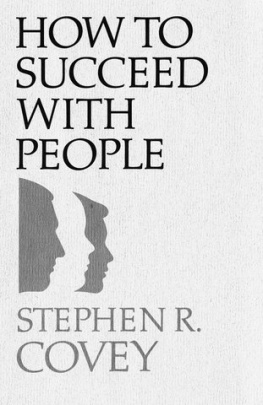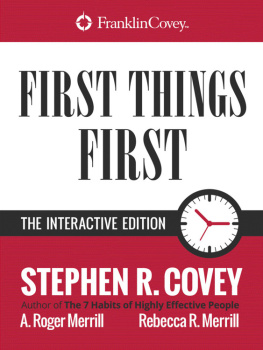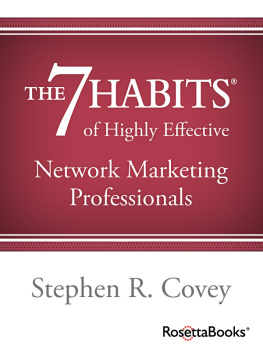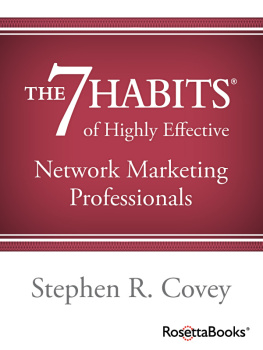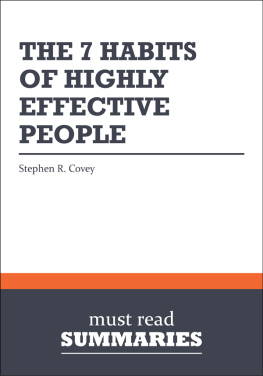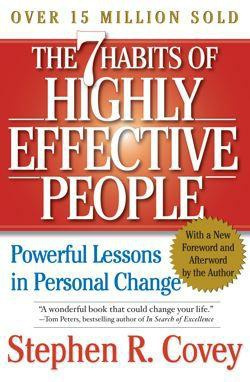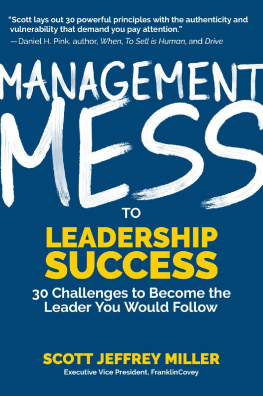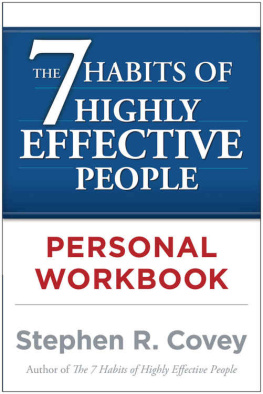
Copyright 2018 Stephen R. Covey.
Published by Mango Publishing Group, a division of Mango Media Inc.
Mango is an active supporter of authors rights to free speech and artistic expression in their books. The purpose of copyright is to encourage authors to produce exceptional works that enrich our culture and our open society.
Uploading or distributing photos, scans or any content from this book without prior permission is theft of the authors intellectual property. Please honor the authors work as you would your own. Thank you in advance for respecting our authors rights.
For permission requests, please contact the publisher at:
Mango Publishing Group
2850 Douglas Road, 3rd Floor
Coral Gables, FL 33134 USA
info@mango.bz
For special orders, quantity sales, course adoptions and corporate sales, please email the publisher at sales@mango.bz. For trade and wholesale sales, please contact Ingram Publisher Services at customer.service@ingramcontent.com or +1.800.509.4887.
Management Essentials: Managing Yourself, Leading Others & Unleashing Potential
ISBN: (ebook) 978-1-63353-913-6
Printed in the United States of America
Preface
The purpose of this little book is to give you the essentials of effective management.
No question, the role of a manager is more challenging and complicated than ever; as a result, too many managers never work effectively. They are overwhelmed with obligations and lose sight of the essentials.
This book gives you the chance to step back, to see the broad picture from a mountaintop perspective.
Here you will find the seven basic habits of effective managersthe things every manager should do all of the time. Here you will find answers to the 25 toughest management challenges. Here you will find a few classic readings and quotations every manager should knowwisdom gleaned from the best thinkers on management. And here you will find a kit of essential tools every manager should use.
Carry this book with you. Live by the 7 Habits. Memorize the quotations. Work each day by the wisdom you find here, and you will make the great contribution you are capable of making.

Chapter 1
Essentials of the 7 Habits for Managers
Every manager approaches the job differently, capitalizing on natural strengths, finding ways to cope with the flood of obligations that come with the job. Still, some managers stand out. They do more than copethey make success a habit. What makes some managers habitually effective? The next few pages show you how to live by the 7 Habits of effective managers.

Habit 1: Be Proactive. They use their R and I their resourcefulness and initiative.
Habit 2: Begin With the End in Mind. They make the unique contribution only they can make.
Habit 3: Put First Things First. They focus time and energy only on truly important priorities.
Habit 4: Think Win-Win. They make Win-Win Performance Agreements to motivate and empower the team.
Habit 5: Seek First to Understand, Then to Be Understood. They listen empathically and give honest, accurate feedback.
Habit 6: Synergize. They consistently seek new and better ways to do things.
Habit 7: Sharpen the Saw. They leverage the whole person, unleashing the potential of each team member.
Maturity Continuum
The 7 Habits form the Maturity Continuum, leading you up the path to effective management. You must first manage yourself before you can successfully lead others. Then you can unleash the potential of the team members to make their highest and best contribution.

Habit 1: Be Proactive
To be a proactive manager, do these three things:
See Alternatives, Not Roadblocks
Where mediocre managers see only the roadblocks, effective managers use their R and I (resourcefulness and initiative) to break through them.
Focus on What You Can Influence
Effective managers focus their efforts on those things they can actually do something about (the Circle of Influence) and stop worrying about things they can do nothing about (the Circle of Concern).

Expand, Dont Limit, Your Resources
Use the Hidden-Resource Finder tool to brainstorm how to break through barriers to results. (See pages 9597.)
A REMARKABLE EXAMPLE OF R AND I
Kiran Mazumdar-Shaw
Kiran returned to her native India from Australia in 1975 with a degree in biotechnology and about $200. Unable to find a job because she was a woman in a male world, she started her own businessBiocon India.
Then she hit more barriers. No one would rent space to her, so with her last $200, she bought a small garage to work in. No one would work for a woman in her town, so a female friend handled the paperwork while she did the chemistry.
She had no luck going the round of the banks and investors for capital; no one would lend to a woman without resources. When she found out that a banker was at her friends wedding, she cornered him at the celebration and talked him into lending her $10,000. The business grew and she started a factory.
Then she ran into labor-union troubles when she bought some machinery. For months in 1985, she had to make her way through an angry crowd just to get to her factory.
Today Kiran Mazumdar-Shaw is the most successful businesswoman in India. At Biocon, she provided jobs for thousands and built a billion-dollar enterprise supplying needed treatments for diabetes and other diseases. She is a remarkable example of a manager who uses her R and I!
Habit 2: Begin With the End in Mind
To be a purposeful manager, do these two things:
Define Your Unique Contribution
Mediocre managers live day to day with no particular end in mind except to get the job done. But what is the job? Effective managers are crystal clear about the job to be done; that is, they know precisely the kind of contribution they want to makethe contribution no one else can make.
Write your Contribution Statement. Share it with your boss and your team and get their input. Let them know what you intend to accomplish in your role and then live by it.
Define Practical Outcomes
Everywhere, Every Time
Let your Contribution Statement drive everything you doevery project, every initiative, every meeting, every presentation.
Use the 5-Minute Planners on pages 99110 to ensure that you define the practical outcomes of everything you do.
FROM WORST TO BEST
Commander Michael Abrashoff
In 1997 Michael Abrashoff was a U.S. Navy officer assigned to command the USS Benfoldthe lowest-performing ship in the Pacific Fleet. Abrashoff dreaded this assignment.
When he attended the change of command ceremony, the retiring captain turned to salute his crew as he walked down the gangplank. The crew loudly jeered and booed him. The humiliated captains face turned as red as the sunset.
Next page
